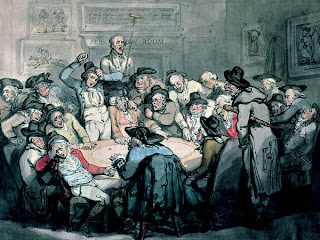Hi Everyone,
It’s always a treat to visit the Riskies . . . and it’s especially fun this time as my new book, TOO WICKED TO WED, is all about taking a risk. Or more precisely, taking a gamble.
Now, we all know that the Regency was mad about gambling. It wasn’t just an amusement—it was a passion! Gentlemen wagered on everything, from horse races and boxing matches to marriage match-ups and how many bottles of port they could drink in one sitting. And of course, there is the famous story of two club members betting on which rain drop would be the first to slide down to the bottom of a windowpane (after tossing back quite a few glasses of that port, I would guess.)
 But games of chance—cards in particular—were perhaps the most popular “risk.” And betting on card games was not a solely masculine vice. Ladies played with equal abandon—Georgiana, Duchess of Devonshire, was notorious for her high-stakes gambles and was constantly in debt (a fact she tried to hide from her husband and the Spencers.) With few funds of her own, she borrowed heavily from friends and acquaintances—and brokered her influence for money. It’s said she got funds from Thomas Coutts of Coutts bank for the promise of introducing his daughter into Society. On her death, she left debts totaling nearly 20 thousand pounds. When told, the Duke supposedly said, “Is that all?”
But games of chance—cards in particular—were perhaps the most popular “risk.” And betting on card games was not a solely masculine vice. Ladies played with equal abandon—Georgiana, Duchess of Devonshire, was notorious for her high-stakes gambles and was constantly in debt (a fact she tried to hide from her husband and the Spencers.) With few funds of her own, she borrowed heavily from friends and acquaintances—and brokered her influence for money. It’s said she got funds from Thomas Coutts of Coutts bank for the promise of introducing his daughter into Society. On her death, she left debts totaling nearly 20 thousand pounds. When told, the Duke supposedly said, “Is that all?”
The turn of a card figures prominently in TOO WICKED TO WED. My heroine, Alexa Hendrie, is a very smart, sensible, practical young lady. But she’s also a little exasperated over the fact that ladies have so many rules governing their behavior, while gentlemen get to go out and play.
So when her cousin suggests that she disguise herself as a man and accompany him to a less-than-respectable gambling soiree, she throws caution to the wind for just one night, and decides to see if she can beat the men at their own game . . . (here’s a short excerpt)
Approaching the smoke-shrouded table, the Earl of Killingworth nodded a greeting to the players. “Who’s the puppy,” he growled, his gaze lingering for a moment on Alexa.
Ducking her head even lower, she made a show of studying her cards.
“Lars—he’s a friend ‘f Sir ‘Enry,” answered Gryff, sloshing more brandy into his glass.
“Lars appears to be a lucky lad,” remarked the Wolfhound, flicking a quick look at the pile of banknotes piled in front of her.
“Nipping at our balls, that’s for damn sure,” muttered Quincy. “Next he’ll be gnawing on my prick.”
Leaning a hip against the back of her chair, Connor crossed his arms. “How very embarrassing,” he drawled. “I, for one, would never dream of letting such an inexperienced mouth anywhere near my privy parts.”
The remark elicited a round of guffaws.
Alexa was suddenly hot all over. Her cheeks flamed, her fingertips burned. But the worst of the flames seemed to be licking at a small spot just below her left shoulder. Beneath the layers of her clothing her skin felt scorched.
The Wolfhound shifted slightly and the fall of his trousers grazed against her.
Dear God. Dear God. As if she needed any reminder that he was a distinctly male animal.
“Your turn to discard, Lars,” chided Quincy.
She threw down a random card.
“Ha! Knew it!’ With a slurred smile, Gryff scooped up his winnings. “Lady Luck’s finally going to kiss my hand.”
“Kiss my arse,” grumbled Quincy.
“Perhaps, you ought to quit while you are ahead,” said Connor softly, eyeing the pair of empty bottles by his friend’s side.
Making a face, Gryff replied with a rude oath.
“Suit yourself,” murmured the earl.
Alexa felt the Wolfhound’s big, muscled body shift again, and silently prayed that he was taking his leave. A trickle of sweat teased its way down her spine, leaving a trail of liquid sparks.
“What’s the matter, puppy?” he snapped. “Am I making you nervous?”
She shook her head, not daring to speak.
“Then stop squirming.”
Her limbs tensed and she held herself very still. This was dangerous.
Oh-so dangerous.
But it wasn’t just fear that was coursing through her blood like hot buttered rum. It was something far more potent—a heady mixture of excitement, elation and some emotion she couldn’t quite define.
After several long moments of silence, the Wolfhound moved away, but only to stand by the marquess.
“Do you wish to pull up a chair and join the game?” asked Gryff.
Holding her breath, Alexa ventured a peek from beneath the brim of her hat.
“The stakes aren’t high enough to tempt me.” The Wolfhound appeared to have lost any interest in the players or the card game. As he turned to survey the room, his gunmetal gaze skimmed over her as if she weren’t there.
Alexa knew she should be relieved, and yet . . .
She wins—and wins big. When the last card has fallen, she fins that she is now half owner of one of London’s most notorious gambling hell. And her new partner is none other than the infamous Earl of Killingworth.
Now how, you might ask, is this going to play out? Well, the game is far from over.
Speaking of playing cards, it was fun to do a little research into the subject as I wrote the book. It’s speculated that the first sets came into Europe from Mamluk, Egypt in the late 14th century. The Mameluke deck was made up of 52 cards, and four “suits”—polo sticks, coins, swords, and cups.
The earliest European cards were painted by hand—there is a record from 1392 of Charles VI of France paying for “the painting of three sets of cards.” Like devotional cards, and other early ephemera, playing card decks were soon printed from woodcut blocks, with the colors often added by stencils, which allowed a “mass” distribution. Engraving, a much more expensive technique, was also occasionally used. Hearts, Bells, Leaves and Acorns became popular for the four suits (there were sometimes five suits in early play) The four suits now used most commonly throughout the world—spades, hearts, diamonds and clubs— originated in France in the late 15th century.
Most of England’s early playing cards came from France, but in 1628, Charles I granted a charter to the “Company of the Mistery of Makers of Playing Cards of the City of London” and all future importation of playing cards was forbidden.
So, what about you? Are you a “gambler” in life? Or do you err on the side of caution? And I’m also curious—do you enjoy cards? Bridge? Poker? “21?” I’ll be giving away a signed copy of TOO WICKED TO WED to one randomly chosen commentator. (U. S. mailing address only, please.)





